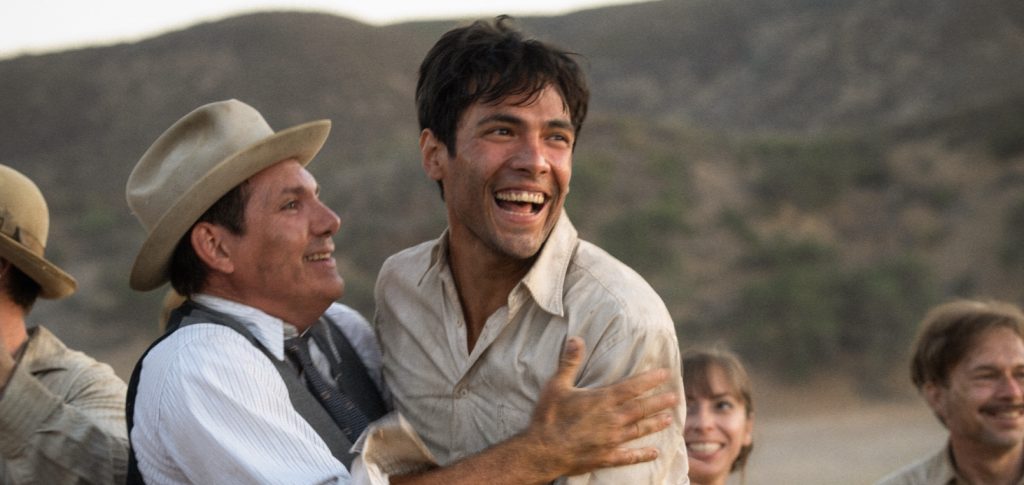Like the elephant in the opening scene that relaxes its sphincter and covers one of its handlers in liquid filth, Damien Chazelle puckers up and explodes all over his audience for three hours in Babylon, a love/hate letter to debaucherous early Hollywood that’s as ambitious as it is unbalanced. This polarising epic is drawing 5-star reviews from some and 1-star from others, seemingly depending on the viewer’s tolerance for exhaustion and appreciation for sensory overload. I sit somewhere towards the higher end of the middle and while the final stretch of the film does not work for me, the majority of what comes before is unabashedly mad and completely unforgettable.
The year is 1926 and Manny Torres (Diego Calva) is transporting the aforementioned giant pooper to an exclusive and excessive party at a Kinoscope Studio exec’s mansion to serve as light entertainment. A Mexican immigrant, these types of tasks are often assigned to Manny; he is so enamoured with the movie industry that he happily obliges and can do what many others may not have the resourcefulness (or stomach) to do. Elephant safely delivered, Manny hangs around and meets Nellie LaRoy (Margot Robbie), an aspiring and overly confident actress with a love of narcotics that almost matches her love for cinema. Despite being surrounded by urine, naked bodies, little people on penis-shaped pogo sticks and enough coke to bring Tony Montana back to life, their interaction is the high point of the party. They bond and Manny swiftly falls in love, until Nellie is called to set the next day to replace an actress who OD’d in the other room.
As fortune would have it, Manny will end up on the very same set. He is tasked with driving home another party guest, an inebriated silent film star named Jack Conrad (Brad Pitt) who then hires him as his own personal assistant. Jack is a man with a penchant for surviving drunken balcony tumbles, blasting through marriages at lightning speed and fast tracking a hangover to appear refreshed and devastatingly handsome only a few hours after passing out. He has a brief but pivotal scene at the end of this shoot – so long as Manny can scrounge another camera (after all 10 of them are broken by horses/nonexistent regulations) and get it back to set before daylight is lost. Both Nellie and Manny dazzle their future employers with their respective ability to cry on cue and ingenuity in employing an ambulance to bypass traffic; the rest is (not quite) history.
Babylon is a bombastic imagining of the advent of Hollywood, based on unsanitised stories that challenge the puritanical, squeaky clean image put forth in the 1950s. Like a certain Hollywood classic from that era, it’s a film concerned with the confusing transitionary period between silent and abruptly loud cinema from the 1920s to the 1930s, notably ushered in by 1927’s The Jazz Singer. Its characters are amalgams of the successes (and failures) seen by folks like René Cardona, John Gilbert, Louis Armstrong and Anna May Wong. According to an article in TIME, Nellie takes inspiration from the life of Clara Bow, a woman whose parents didn’t bother getting a birth certificate for her because her older siblings both died during childhood. Some of that pessimism finds its way into Chazelle’s screenplay but ultimately, Babylon celebrates both the glitzy facade and the dirty, stinking underbelly of the film industry.

Manny saving the day(light).
Like Tarantino’s Once Upon A Time…In Hollywood, Babylon allows its director’s passion to ooze out of every frame. Highlights include the first tour through the huge outdoor set where multiple projects are being shot and the concept of “losing light” becomes all too real, and an absolutely thrilling sequence illustrating how many things can go wrong when simply trying to capture a single scene on a stage. The editing in the latter is right up there with J.K. Simmons’ simmering rage and eventual chair-hurling outburst in Whiplash, raising audience anxiety (and engagement) to its peak before letting it all out at the scene’s climax. Moments of side-splitting humour are not something I expected Babylon to offer, but they are as effective as its larger scale operatic sequences and performed with equal commitment and intensity by its brilliant cast.
Margot Robbie gives the performance of her career as Nellie, the furthest a lady could be from Barbie and the closest she could get to death before having rattlesnake venom sucked out of her neck. As the object of Manny’s (and no doubt, our) desire, she epitomises that doomed, short lived beauty that old Hollywood was known for. Diego Calva’s wide-eyed Manny is the lens through which we experience this dazzling and dangerous world, and Brad Pitt brings what only Brad Pitt could bring – adaptive leading man energy to a character that will never again experience it.
Supporting performances are often scene-stealers, like Spike Jonze as the eccentric and self-important filmmaker whose German accent is almost intentionally bad. Or Samara Weaving, whose presence seems like an in-joke about the rate at which she and Robbie are mistaken for one another. Or the absolutely wonderful P.J. Byrne as the tightly wound assistant director who might actually explode if another person walks through Stage Door 2 during the 18th take of the one scene they need to capture. Tobey Maguire’s turn as a drug kingpin who resembles an ill Victorian child is the stuff of nightmares, while his Dante-inspired tour through descending depths of depravity in the Hollywood hills signals that all parties must end.
It’s after this point that Babylon loses steam and the cracks in the narrative start to become more obvious. Chazelle loses sight of some characters while trying to cover all necessary developments and downfalls, and then seeks to bring them together again once the moment has well and truly passed. The central love story loses its power and no longer inspires the emotion necessary to care about how it is resolved, while the final odd supercut of landmark movies feels like a nonsensical excuse to end the film with an explosion of irrelevant imagery.
Despite its weak ending and sometimes unbalanced storytelling, this is a film of enormous ambition that should be celebrated for its boldness. Chazelle throws everything into the pot to give Babylon more flavour; some of it tastes amazing, while some of it is “not quite my tempo.” So how do you score a three course meal where entree and main are divine but dessert is lacking? You blast Justin Hurwitz’s pulsing big band score on the drive home and pick up a McFlurry to round out an experience you’re not likely to get again any time soon. 7/10
Babylon is in cinemas January 19 and pairs nicely with a salty snack, a stiff drink and a strong bladder.






